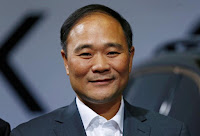Yes, we are going to Sweden! After that sneak peek at a possible new Volvo, I decided to focus on Sweden, firstly to pay tribute to two designer friends of mine, and then to look at the renaissance of Volvo.
Sweden could not be more different from my home country, situated as it is at the polar opposite of Australia’s spot on the globe. Sweden covers just 451,000 sq.km, and has a population of 11 million people.
Australia boasts 7.7 million sq. km and 26 million people, and whilst we are able to enjoy four distinct seasons in some parts of Australia, our mostly dry continent contrasts significantly with Sweden’s blanketing by snow and ice for a good part of the year.
Those weather extremes render both countries inhospitable in parts, however I believe both societies are driven by youth, energy, a quest for technological achievements and entrepreneurial-thinking.
Ford sold Volvo to China’s Geely in 2010, and this has allowed Volvo to flourish, prosper, and more importantly, continue to exist.
However, like its national stablemate, Saab, Volvo has created and produced some great technology and great cars over the years. Volvo design has always been, like Saab, a little quirky and occasionally hasn’t been to the world’s taste from time to time.
I like to think that Volvo became a much more convincing global player when British designer Peter Horbury joined the company in 1991. He brought along a new design language, and had two stints with the company.
His second stint began in 2009, and a year later the company was acquired by Zhejiang Geely Holding Group Co, which became a Chinese automaker in 1997. Geely is privately held by business magnate Li Shifu.
It’s not just Geely’s acquisition of Volvo that has been vital to the company’s continuance as a significant global carmaker, it is also an important window into the thinking of 54-year old Li Shifu.
He started business in 1986 with loans from his family and got into manufacturing refrigerators. In 1997 Geely began manufacturing cars for the domestic market.
However, the company’s growth as an automaker really began with the Volvo Acquisition in 2010. Shortly after Mr Li acquired Volvo, in 2013 he acquired the famous London Black Cab company, and restarted production.
Since then Geely acquired a 51% stake in Lotus from DRB-HICCOM (Proton of Malaysia), in which he took a 49% stake to help rebuild Proton's participation in RHD markets. Prior to becoming just a carmaker, Volvo was part of Volvo Group which included the Volvo truck, bus and construction business, and in 2017 Geely invested 3.25 billion Euros in Volvo Group.
In 2018 Mr Li acquired a 9.7% stake in Daimler AG, and started talks to take over SMART.
All this growth is solely guided by Li Shifu, who is not affiliated with the CCP, and is a completely independent businessman and entrepreneur. He is the 63rd richest person in China, with a net worth of USD$2.6 billion.
However, what I find interesting are his opinions on managing this huge variety of businesses. At the time of announcing a JV with China Aerospace to develop a new line of supersonic bullet trains he said: "Core technology can't be bought. The more you use others' technology, the more reliant you become. We have to innovate on our own. The journey will be tough but the prospects are promising."
Li Shifu has also slammed Chinese carmakers who depend solely on imported manufacturing expertise. He believes that independence is achieved by developing innovation and technological expertise within your own company, and is one of the main contributors to Geely’s growth and growing significance on the world stage.
Currently his car brand portfolio consists of Volvo, Polestar, Lotus, Proton, Lynk & Co, London EV Company (Black cabs) and in September of this year acquired a 7.6% holding in Aston Martin Lagonda.
Where I often question 'so-called' brilliant entreprenuers for trying to juggle billions in loans and still service their debts, I have the feeling Li Shifu is cast in a different mould.
With his energy, commitment and financial skills driving this potpourri of car companies I believe Geely will become one of the most important car companies globally in less than a decade. I also think the Swedes will thank him profusely for saving a Swedish icon.

.jpg)



.jpg)

No comments:
Post a Comment